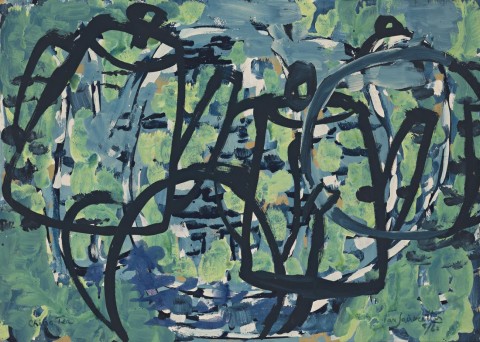CHINA TEA, 1963
IAN FAIRWEATHER
synthetic polymer paint and gouache on cardboard
68.5 x 94.0 cm
signed and dated lower right: Ian Fairweather / 8/63
inscribed with title lower left: China Tea
Donated by the artist to the Bribie Island Pensioners’ League raffle, summer 1963
Private collection, Melbourne
Lina Bryans, Melbourne
Thence by descent
Private collection, Melbourne
Fairweather: A Retrospective Exhibition, Queensland Art Gallery, Brisbane, 3 June – 4 July 1965; Art Gallery of New South Wales, Sydney, 21 July – 22 August 1965; National Gallery of Victoria, Melbourne, 9 September – 10 October 1965; National Gallery of South Australia, Adelaide, 26 October – 21 November 1965; Western Australian Art Gallery, Perth, 9 December 1965 – 16 January 1966; Tasmanian Museum and Art Gallery, Hobart, 10 February – 13 March 1966, cat. 88 (label attached verso)
Bail, M., Fairweather, Murdoch Books, Sydney, revised edition, 2009, pl. 169, cat. 194, pp. 199, 200 (illus.), 258
After a peripatetic existence that saw him living in England, Canada, China, Bali, Australia, the Philippines and India, Ian Fairweather settled on Bribie Island, off the coast of southern Queensland, in 1953. Here he found a place where he could work consistently and relatively undisturbed, and the last two decades of his life witnessed the production of some of his finest paintings. Living and working in a pair of thatched huts that he had built using materials found in the nearby bush, and painting by the light of a hurricane lamp, his surrounds were primitive, but offered everything that Fairweather needed. While he relished the isolation of Bribie Island and preferred not to engage with the art world in person, Fairweather exhibited regularly at Macquarie Galleries in Sydney, and his work was both seen and admired by curators, critics, collectors and fellow artists alike. The 1960s saw his work acknowledged in significant ways, with paintings being included in the landmark exhibition Recent Australian Painting at the Whitechapel Gallery, London (1961), the São Paulo Biennial (1963), the European tour of Australian Painting Today (1964 – 65) and in 1965, a major travelling retrospective of his work – which included the painting on offer here – was mounted by the Queensland Art Gallery.
Fairweather described painting as being ‘something of a tightrope act’ that for him, sat ‘between representation and the other thing – whatever it is’ and, as he explained in an interview with Hazel de Berg in 1965, it was ’difficult to keep one’s balance’.1 At first glance, China Tea, 1963 is more representational than much of Fairweather’s work, depicting the outline of teapots – both tall and round in shape – that appear to move across the surface of the painting as if they are being lifted and poured, almost like stills from a film. We can see in this work a manifestation of the artist’s vision of the surrounding world, ‘not only as a whole, but fragmented, moving, regrouping, the outlines fluid and changing as they [settle] into the picture’.2 Despite its recognisable subject however, China Tea has all the hallmarks of Fairweather’s unique brand of abstraction, combining a lively tracery of gestural marks that form their own distinctive calligraphy as they mesh and overlap, with a richly layered background made up of broad daubs of vivid blue and green paint.
In the summer of 1963 the Bribie Island Pensioners’ League had asked Fairweather if he would donate a painting to their fundraising raffle and this is the work he chose.3 In a remarkable coincidence the holder of the winning ticket was a visitor from Melbourne, the RAAF pilot who had flown the plane that searched for Fairweather in 1952 after he left Darwin on his ill-fated attempt to sail to Timor on a rudimentary hand-built raft.4 China Tea was later acquired by Lina Bryans, a noted modern artist and close friend of Fairweather. Having first bought his work in 1934, Bryans established what was widely regarded as the best single private collection of his art.5
1. The artist quoted in Bail, M., et. al., Fairweather, Art & Australia Books in association with Queensland Art Gallery, Brisbane, 1994, p. 139
2. The artist quoted in Eagle, M., ‘The Painter and the Raft’, Bail, M., ibid., p. 25
3. Bail, M., Ian Fairweather, Murdoch Books, Sydney, revised edition 2009, p. 199
4. ibid.
5. See Forwood, G., Lina Bryans: Rare Modern 1909-2000, The Miegunyah Press, Melbourne, 2003, pp. 90 – 92
KIRSTY GRANT
